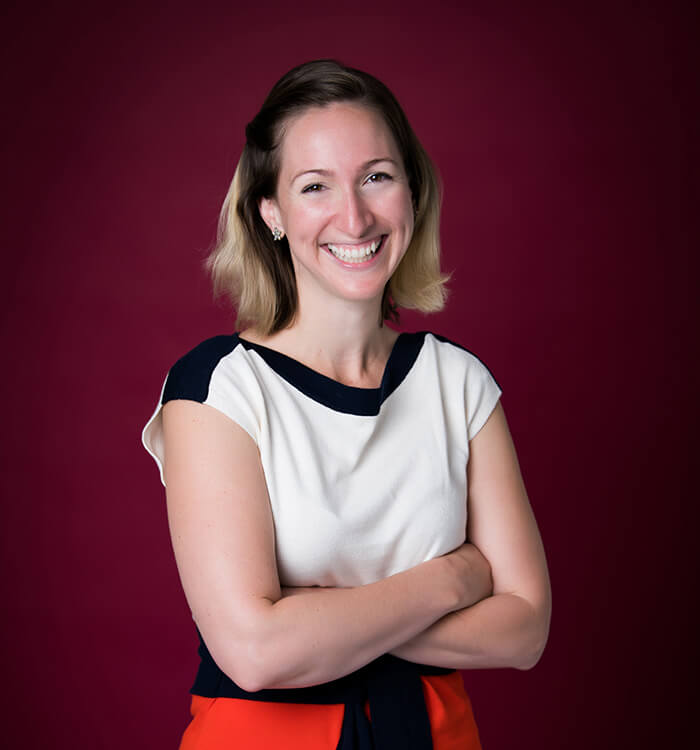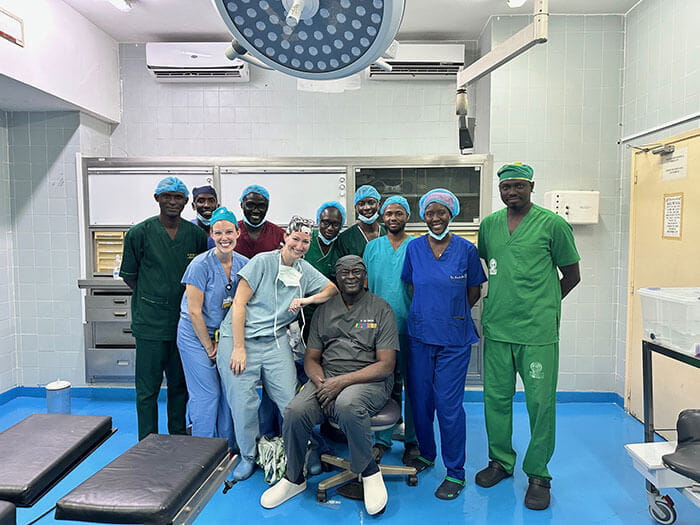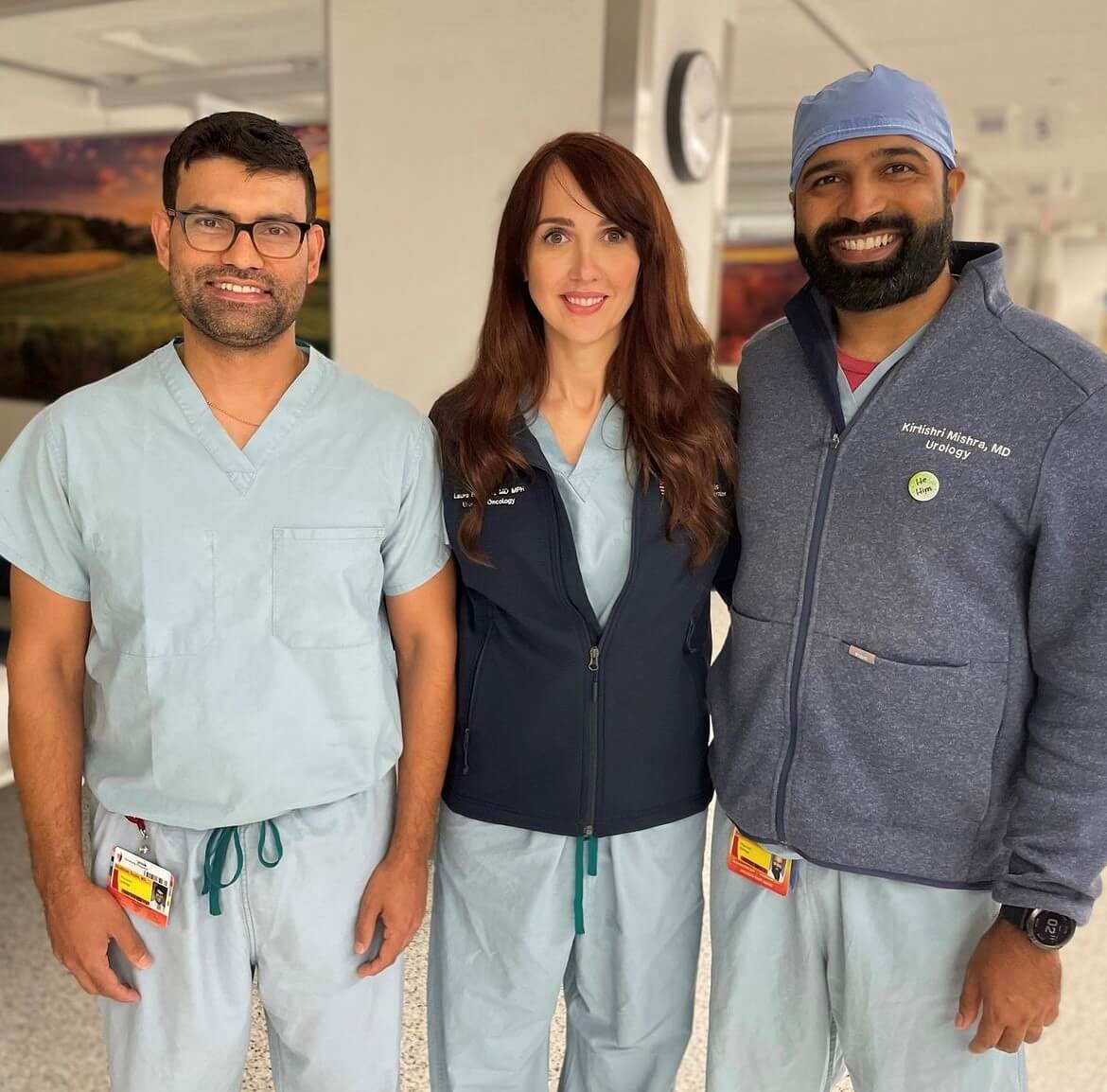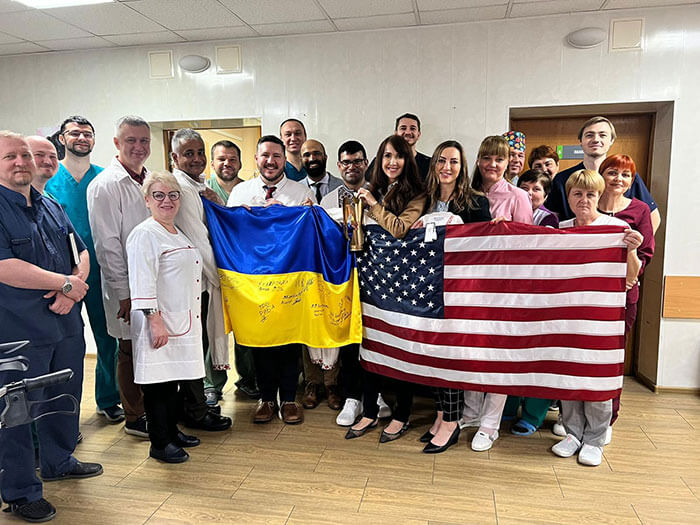University Hospital's Urology Physicians Return from Global Medical Missions
December 03, 2023
Innovations in Urology | Fall 2023
University Hospitals clinicians are undoubtedly committed to improving the health and wellbeing of Northeast Ohio communities, but often leverage their skills to help a different patient base. In 2023, members of the University Hospitals Urology Institute traveled abroad to complete powerful medical missions centered on surgical reconstruction. Alongside clinical advancement and the sharpening of skills, humanitarian efforts are a core value for the program.
 Rachel Pope, MD, MPH
Rachel Pope, MD, MPHRepairing Childbirth Trauma in Africa
In August, gynecologist and obstetrician Rachel Pope, MD, MPH, and Female Pelvic Medicine & Reconstructive Surgery fellow Susan Wherley, MD, traveled to Dakar, Senegal, to repair obstetric fistulas (OF) and advance surgical capacity in the region, alongside their host, Professor Serigne Magueye Gueye, MD, FWACS. OF is a complication of prolonged, obstructed labor that often leads to chronic incontinence, shunning within the community and deepening poverty for women who are medically marginalized.
“In Francophone West Africa, urologists are the ones doing fistula repairs, as compared to gynecologists in other parts of the world. To address obstetric fistula in the region, we needed to work within that subspecialty,” says Dr. Pope, a Roe Green Global Health Scholar, Division Chief of Female Sexual Health within the University Hospitals Urology Institute. “This outreach is only possible because of Dr. Lee Ponsky's, our chairman, commitment to global health and the generous financial support of the Roe Green Center for Travel Medicine & Global Health.”
Prior to joining the faculty at University Hospitals, Dr. Pope completed a two-year fellowship in Global Women's Health in Malawi, Africa, staying on for two additional years as Medical Director and Chief Surgeon at Freedom from Fistula’s Obstetric Fistula Hospital. She has extensive experience in vesicovaginal reconstruction and has trained dozens of surgeons in the intricate techniques necessary for successful OF repair.
Her recent medical mission to Dakar laid the groundwork for ongoing collaboration between the UH Urology Institute and physicians in the region. While subspecialty training in Sub-Saharan Africa is rare, Dr. Pope explains that Dakar has a robust urology department.
 Drs. Pope & Samarco pose with their clinician-hosts and OR team in Senegal.
Drs. Pope & Samarco pose with their clinician-hosts and OR team in Senegal.“I usually travel to remote, rural parts of Sub-Saharan Africa because that is where women with obstetric fistulas tend to live, so it was interesting to be in the capital of Senegal with more advanced technological and medical capabilities,” she says. “We have so many incredible academic and surgical specialists at University Hospitals who can contribute to Dakar’s residency training program and gain first-hand experience treating cases not often seen in the U.S.”
While some medical missions have requested high volume, such as 50 cases in a week, this time, the team focused on 12 women with complex fistulas who had endured multiple previous repair attempts. “For a woman to go through three or four surgeries that did not work is just devastating,” says Dr. Pope. “It is my honor and privilege for these women to trust me to help them achieve a lasting repair.”
In addition, Dr. Wherley taught prolapse repair techniques to the residents, and the pair donated supplies and demonstrated urethral bulking for stress urinary incontinence. “Dr. Wherley has been dedicated to global health work since her undergraduate years,” says Dr. Pope. “It was rewarding to have her come to Senegal to gain hands-on experience and contribute her skills as a urogynecology fellow.”
Impactful Donations
“We brought two suitcases full of urologic and gynecologic supplies donated by MedWish International,” says Dr. Pope. Founded in 1993 by Lee Ponsky, MD, FACS, Professor & Chairman, UH Urology Institute, the Cleveland-based nonprofit provides humanitarian aid worldwide by repurposing medical supplies and equipment.
Additionally, MAP International donated specialized surgical instruments, including fistula scissors developed by Dr. Pope and engineers at DePuy Synthes, a subsidiary of Johnson & Johnson. “Our goal has been to create affordable fistula scissors that are very sharp and can be resharpened locally,” she says. “It was exciting to see that process come full circle and be able to deliver five pairs of donated scissors that will continue to impact women in Dakar.”
New Fellowship Opportunity
The UH Urology Institute, in collaboration with the School of Medicine, is recruiting candidates for a new fellowship in female reconstruction and sexual health. “I am excited to take on a fellow who is interested in learning these surgical techniques and could potentially travel with me on future trips to reduce barriers to needed urological and gynecological care,” says Dr. Pope.
Treating War Injuries in Ukraine
 UH urologists from left to right: Shubham Gupta, MD, FACS; Laura Bukavina, MD, MPH, MSc; and Kirtishri Mishra, MD
UH urologists from left to right: Shubham Gupta, MD, FACS; Laura Bukavina, MD, MPH, MSc; and Kirtishri Mishra, MDIn October, one Ukrainian-born urologic oncologist, Laura Bukavina, MD, MPH, MSc, two reconstructive urologists, Shubham Gupta, MD, FACS, and Kirtishri Mishra, MD and a second-generation Ukrainian-American fourth-year urology resident, Andrew Drozd, MD traveled to Ukraine. Their mission was to repair devastating genitourinary trauma sustained during the country’s ongoing war with Russia.
The UH Urology Institute colleagues flew to Poland before walking across the border into Ukraine to meet their driver. Joining the team was a surgeon from the University of San Diego and a surgical assistant from Cleveland Clinic who speaks Ukrainian and helped translate. The medical mission was the fourth for Dr. Bukavina since the Russian invasion in 2022. Over the 10-day trip, the team treated 21 patients with complex pelvic trauma.
“Lviv in western Ukraine was our first destination, and we treated five patients,” says Dr. Bukavina. “The city was full of refugees, and many people needed reconstructive surgery because, just as military personnel get injured during war, so do civilians.”
After two days, the team traveled on to Kyiv and operated on 16 soldiers, often spending five or more hours on each patient. In wartime, polytrauma from blast injuries affects muscle, bone and tissue. The team witnessed complex injuries to the penis, scrotum and rectum, damage to urethral tissue and kidneys, and young men requiring colostomy bags.
“Reconstructive urology is a fairly new field all over the world, and the U.S. has only been practicing it for the past 10 to 15 years,” says Dr. Bukavina. “In Ukraine, the subspecialty was not well known before the war, but now the country needs reconstructive urologists on top of the country’s other gifted surgeons to be able to give patients a good quality of life.”
 A display of multi-national pride at a hospital in Ukraine.
A display of multi-national pride at a hospital in Ukraine.In the six months leading up to their trip, the team held multiple meetings with the surgeons in Ukraine to select patients who were deemed eligible for reconstruction and capable of the recovery process. Running three concurrent operating rooms, each surgeon was paired with one or more Ukrainian counterparts who assisted and observed. Someone was always available to translate the steps of each procedure. The surgeries were also recorded for further study.
Many of the 21 patients will require second-stage procedures to complete their reconstruction. The team plans to return in a few months to perform follow-up surgeries and are also committed to teaching these advanced surgical techniques. “One of our mission’s primary goals was to prepare the physicians in Ukraine to do these surgeries independently,” says Dr. Bukavina. “That is not possible in a single trip, but it was a great introduction to what is possible.”
A Fully Stocked Ambulance
Along with their expertise, the team delivered an ambulance donated by University Hospitals fully stocked with 800 pounds of medical supplies from MedWish International. Travel expenses were donated by Cleveland Maidan. “We also held a fundraiser which raised almost $9,000, so we were able to purchase retractors and other instruments that we left in-country for the surgeons to continue to use,” says Dr. Bukavina.
A Transformative Experience
We’ve been following along as the whole world has, and there has been a great medical need from the trauma of war,” says Dr. Mishra, Reconstructive Urologist with the UH Urology Institute and Assistant Professor at the School of Medicine. “We were happy to help.”
“We aren’t going to change the world in one trip, but there are a lot of skills and expertise we can bring to bear,” says Dr. Gupta, Division Chief of Reconstructive Urology, UH Urology Institute, Surgical Director, UH LGBTQ+ & Gender Care, University Hospitals; and Associate Professor at the School of Medicine.
Dr. Drozd, who grew up in Broadview Heights and now lives in Parma – a heavily Ukrainian-populated Cleveland suburb – helped translate in the OR while assisting. “It was humbling to help provide operative solutions to complex urologic traumatic injuries in the brave soldiers fighting to maintain Ukraine’s sovereignty,” says Dr. Drozd. "Having the chance to educate and impart surgical techniques to help them care for both wounded warriors and civilians was incredible.”
University Hospitals is proud of the efforts made by these selfless clinicians and will continue to promote and support them locally and abroad.
For more information, please contact Dr. Pope at Rachel.Pope@UHhospitals.org or Dr. Bukavina at Laura.Bukavina@UHhospitals.org.
See Also:
Contributing Experts:
Rachel Pope, MD, MPH
Division Chief, Female Sexual Health
University Hospitals Urology Institute
University Hospitals Cleveland Medical Center
Associate Professor
Case Western Reserve University School of Medicine
Laura Bukavina, MD, MPH, MSc
Urologic Oncologist
University Hospitals Urology Institute
University Hospitals Cleveland Medical Center
Assistant Professor
Case Western Reserve University School of Medicine


